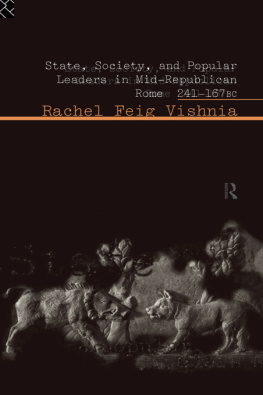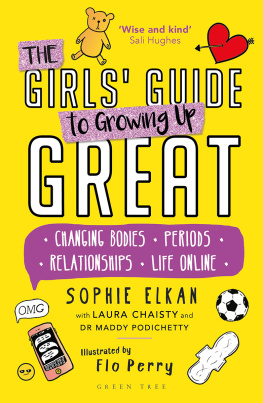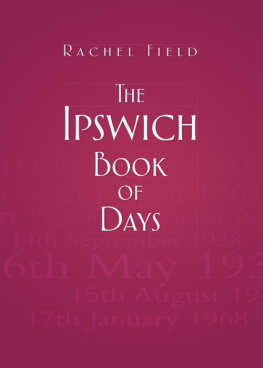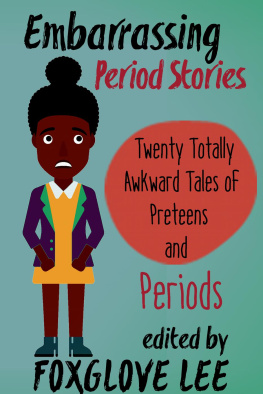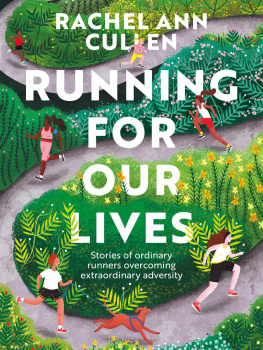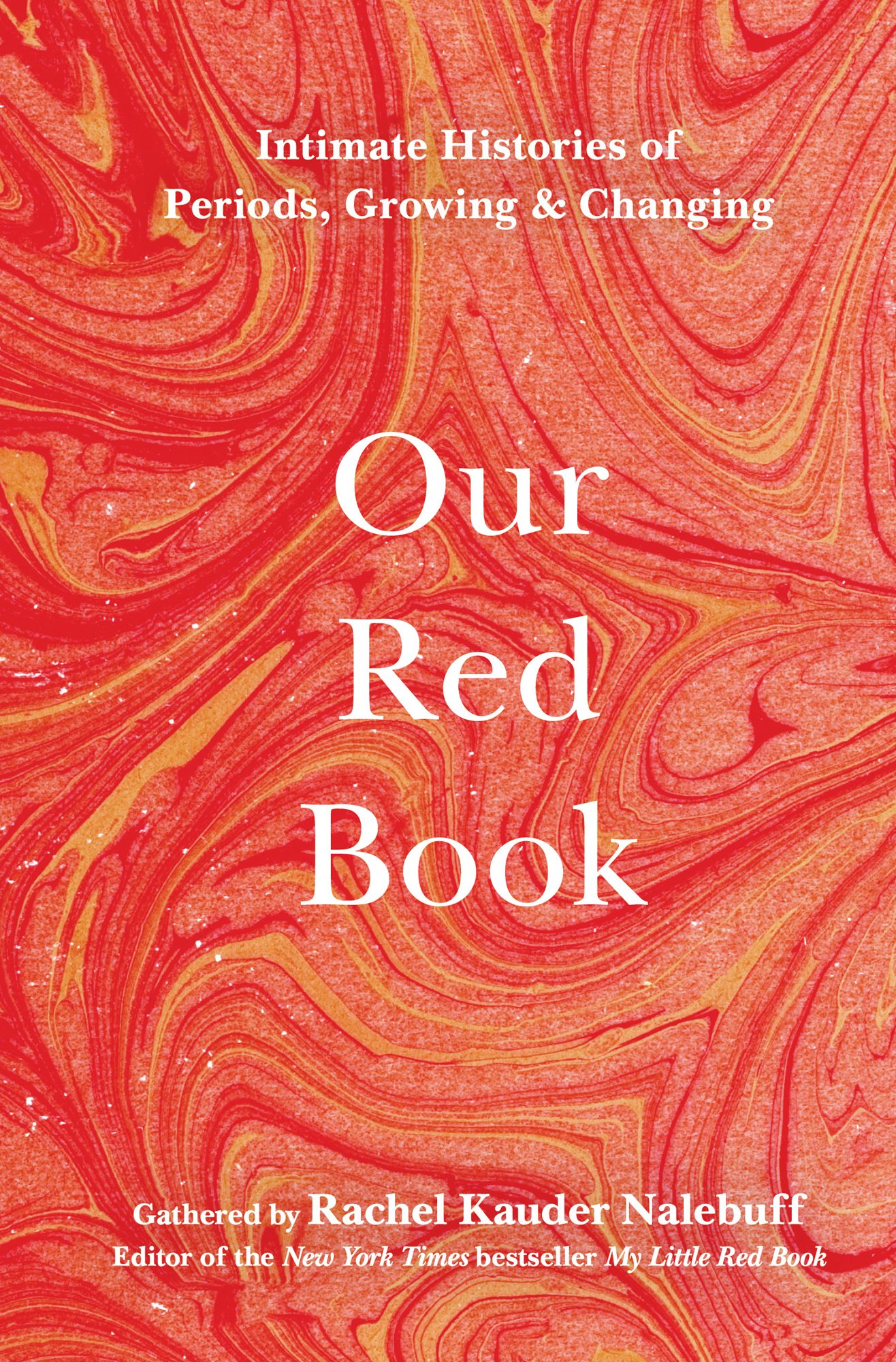Contents
Guide
Intimate Histories of Periods, Growing & Changing
Our Red Book
Gathered by Rachel Kauder Nalebuff
Editor of the New York Times bestseller My Little Red Book
Intimate Histories of Periods, Growing, and Changing
A Note from the Editor
In between your hands are many voices, speaking their most intimate histories related to bleeding and menstruation. Together, they offer a glimpse of history as it lives under the skin and pulses through us.
This book is not a comprehensive collection of every story there is to tell about first blood, last blood, missing periods, birth, bleeding after transitioning, staining things, aching, grieving, communing, aging, and changing. Rather, it is a telling that has unfolded over my lifetime. It is a web of memories gathered from people I know, people they knowtheir parents, grandparents, friends, loversand eventually strangers I wanted to knowwriters, experts, community leaders, activists, young people, and other visionaries.
Like periods, these histories are not tidy or neat. They trickle, overflow, and circle back. They can weigh you down, inspire sudden joy, and instill spirituality. These accounts are not what Americans might call stuff for children, and yet, they are what children live through.
Some voices in this collection echo one another, and others rub against one another, forming a chorus that resembles reality. Each account stands on its own, but if you read pieces in order, you may find that patterns, connections, and fateful threads await your discovery.
As much as I can, I want to share these stories with you the way I would in person. Sometimes Ill tell you how a story came my way or how someones story has altered me, haunted me, or led me down unexpected life paths. Given all the blood spilled, it seems important to speak with you from an intimate, human place.
The Aunts

I wonder what would have happened if I had understood shame as a young person. If this even could have been possible.
Im only starting to understand it now. My friend Merkel explained it to me the other day while we were walking in the park.
Underneath shame, she said, is a source of power that someone is afraid of you unlocking.
And then she said, I didnt come up with that. I heard it from a friend whos a witch, who also probably heard it first from someone else.
This book begins with a memory I received when I was a child.
I was twelve and shy.
I had recently gotten my first period while on vacation visiting my widowed grandfather. Despite my repeated calls home, no one in my family was picking up the phone. I cried, helplessly, in my grandfathers bathroom, holding an assortment of large tampons that must have been left behind by his deceased second wife.
Eventually, my grandfather drove me to a pharmacy, where he dropped me off in the parking lot and said, Go inside and figure it out.
A few weeks later, at a family Passover seder in Queens, I was sitting at the kids table, like every other year of my life beforehand. Clinking her glass, my mom announced to my extended family that I had become a woman.
Looking back on it, I understand this moment and the day of my first period as my first of many encounters with shame. Though I also know that memory is slippery and that this is an attempt now, at age thirty, to make sense of a heat and weight I felt in my body then, for which I did not have words.
My tante Nina, my great-aunt, must have recognized something in me. Later that night, in her bedroom, which smelled like cat litter and everyones winter coats piled onto the bed, she told me a story.
Tante Nina
I was thirteen. It was 1940. We were fleeing Poland and the deportation of the Jews. The atrocities committed by the Germans were getting worse. Ghettos were being formed. My uncles in Belgium and France went through enormous troubles to obtain visas and passage for us to get out. To reach Belgium, we had to pass through Germany. My story takes place on the train arriving from Poland at the German border crossing. The train stopped, and we were told to get completely undressed for the customs guards to search us.
The guards were mostly searching for hidden jewelry, and they looked in the most private places. It was horrible. I had hidden my yellow Star of David in my shoe, but it was discovered. In my fright, I completely lost it and peed in my pants. But when I looked down, what I saw was actually a stream of red. I raced into the compartment, and my mother saw what was happening. She rushed to the toilets at the end of the train and grabbed lots of rolls of toilet paper, one of which she shoved into my underwear. She was somehow able to do this so discreetly that my two sisters and brother never knew about this. She whispered to me that now I was going to be a big girl on whom she was going to have to depend, that this would happen every month. But most important, she told me, in Belgium and France, where we were heading, they had excellent napkins, much better than in Poland.
My great-aunt was tiny, with a large beak of a nose. She spoke with a thick French accent, and her voice was extremely nasal. Up until that point, our conversations had pertained mostly to making jewelry out of Sculpey and how much we both loved frozen waffles.
I knew she had lived through something. I knew she had fled the war. But even words like survive and Holocaust felt abstract to me, as a child who had lived through nothing. For the first time, I saw my tante Nina as someone who had once been my age.
You lived through that?
My mother and my aunts had never heard this story, either.
So your period spared you from being examined by the officer? my mother asked.
Oui, my tante Nina said. The officer had been too disgusted to continue.
Why have you never shared this story avec nous? my mom asked. This story about your period saving your life.
Parce que ce nest pas quelque chose discuter.
Because its not a subject we talk about.
My mom was shocked.
And yet, I had never heard my mothers first period story, either.
No one, of any generation, it seemed, had shared anything in any direction.
It was only after my great-aunt shared her story that my other family members started talking.
Aunt Lienna
I was in the hospital for a tonsillectomy. I was not quite eleven, and in Soviet Russia, if you were not yet a teenager, they would put you in a room with ten other kids.
They had a wooden armchair, similar to an execution chair, with all these straps. They strap your legs, your arms, and your body, and a nurse is holding your head, because there is only local anesthesia.
At the same time, another surgery is happening across the room. So you see whats happeningor about to happenright in front of you. The other surgeons apron is splattered with blood, and of course everyone is screaming.
The surgery was such a shock to my body, I think, that I got my period. There were no antibiotics, so hospitals, afraid of bacteria, would not allow parents to visit. But I was fortunate because my mom had already told me about periods.
Bleeding from my mouth and my vagina, I went to the nurse. I said, I have my period. Can you give me something? And then



